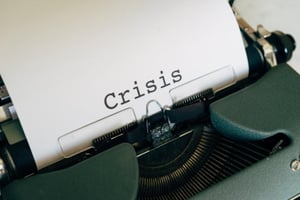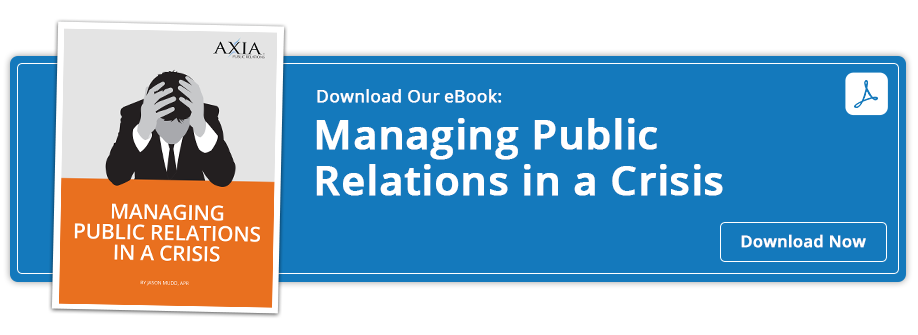 A crisis communications plan protects and defends companies and organizations from a fallout in the public eye. These crises are caused by issues like a company scandal, an executive’s inappropriate behavior, or a product recall. Developing a crisis communications plan can help companies maintain their reputation.
A crisis communications plan protects and defends companies and organizations from a fallout in the public eye. These crises are caused by issues like a company scandal, an executive’s inappropriate behavior, or a product recall. Developing a crisis communications plan can help companies maintain their reputation.
Companies task public relations agencies to design comprehensive crisis management plans that limit risks to their brands. We craft specific messages for employees, investors, customers, the public, and news outlets. Insufficient external and internal communications can cause the following:
-
Operational response failure
-
Stakeholders reacting negatively
-
Public perception that the company is inept and, even worse, criminally negligent
-
Sever impact on the company’s brand, reputation, and finances
Axia Public Relations will design a crisis communications plan beforehand to minimize the damage to your reputation. Through crisis preparedness and timely responses, we can prevent situations from evolving into a full-scale crisis.
Let us share a few essential tips on creating a crisis communications plan to battle the brewing storm and change its direction.
1. Brainstorm All Potential Scenarios
Our public relations agency’s crisis response team brainstorms all potential scenarios that can affect your company’s reputation negatively. Through brainstorming, you’ll realize that you can modify current operational methods to prevent potential situations from occurring.
We will create probable responses to both negative and positive situations. If a situation we had predicted earlier surfaces, we can deliver the solution immediately.
2. Select Spokespersons to Represent Your Company
You need to select spokespersons to speak on your company’s behalf during a crisis. We’ll pre-screen and train spokespersons to handle various communications channels. Your organization’s spokesperson needs to possess the right skills, position, and training to represent your company on a large scale.
Your spokesperson(s) will handle all online communication. This includes posting on social media during a crisis. As you may know, an ill-thought-out post or tweet can negatively affect the company’s image.
Therefore, it is extremely important to select the right spokesperson to address the public during a crisis. Your public relations agency will draft a statement for the spokesperson to say online and offline. The spokesperson needs to hold a prominent position in your company, and he or she must know how to deliver certain statements to the public, especially if doing it publically and by video.
3. Proactive PR vs. Crisis Communications
Your spokesperson needs to understand the difference between proactive PR and crisis communications. Proactive PR promotes your company, whereas crisis communications preserves your company. Addressing a crowd of hostile reporters can be a daunting experience for spokespersons.
Your message can be lost, misunderstood, or misinterpreted in the media. It is our responsibility to ensure that doesn’t occur. We’ll train your spokesperson, preparing him or her to respond in a manner that optimizes your stakeholders’ responses.
4. Monitor Situations to Notify Stakeholders Quickly
We’ll monitor all communications closely. For instance, a product launch can backfire and cause a crisis. If it does, we’ll already know how to deal with it. We’ll notify your internal and external stakeholders via phone, email, text message, or instant messaging app.
We’ll send them audio messages to alert them of a developing situation. We need to set up these communications channels to reach out to your stakeholders before — not after — a crisis breaks. Social media spreads news like wildfire, and you need to tame the fire before it spreads.
We’ll also establish a monitoring system to learn what your customers, employees, and other stakeholders are saying about you. This will help us monitor your stakeholders’ reactions and develop strategies and tactics to formulate appropriate responses to address them.
We’ll establish the monitoring system beforehand. The monitoring systems include Google Alerts and social media tracking apps as well as MediaSignal, our professional monitoring program, from multiple services bureaus. You’ll need to designate certain employees to be on the lookout for anything related to you and your company circulating on social media. You or they can report to us directly so we can eliminate the crisis.
5. Determine Your Stakeholders
Internal and external stakeholders will discuss your company outside of work to people who have nothing to do with your company. You need to provide them with the information you want them to repeat to others. You also need to consider what actions you might take against a stakeholder, such as an employee should he or she say something on social media that violates his or her employment agreement, your company policies, or negatively impacts your company by association.
For instance, a person recorded your employee on camera discriminating against another person due to his or her ethnicity. You’ll need to distance yourself from that employee quickly. Depending on the exact circumstances, this may include firing the employee and telling your stakeholders that his or her views do not reflect the company. As always, you should consult with your legal counsel.
6. Create Holding Statements
Our crisis communications plan consists of holding statements. We’ll create them in advance so we can release it right as the crisis breaks. Holding statements allow us to address a situation immediately and when we don’t have access to any factual information. A holding statement may look like, “we’re thinking about those affected and working quickly to get answers.”
Your public relations agency will regularly review your holding statement to determine if it needs to revise or modify it and/or develop new holding statements for potential situations.
Last Word
You need to invest in a crisis communications plan because you can have a crisis when you least expected it. Having a crisis communications plan can also prevent you from getting into tricky situations in the first place.
With our help, we can design an effective crisis communications plan to eliminate even the smallest signs of a crisis. With Axia, your company will flourish untainted. We’ll design a crisis communications plan to build trust among your stakeholders and maintain your reputation.
A crisis communications plan is like a well-maintained wall barricading a potential crisis from breaking through. Contact us today for a crisis communications consultation with Jason Mudd, APR.
Topics: public relations, PR tips, crisis communications



Comment on This Article